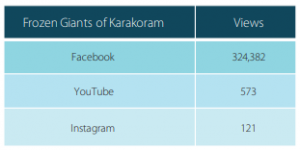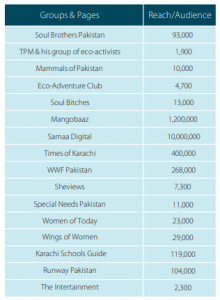The fourth Nature Series documentary, Frozen Giants of the Karakoram, was launched online in June 2020 amidst the COVID-19 pandemic, due to which screenings across the country and in schools had to be postponed indefinitely.
Frozen Giants of the Karakoram focuses on the glaciers of Pakistan. With 7,253 known glaciers, including 543 in the Chitral Valley, there is more glacial ice in Pakistan than anywhere on Earth outside the Polar Regions, according to various studies. Glaciers in Pakistan are concentrated in the North of the country, in the Hindu Kush and Karakoram mountains, and cover an area of about 16000 km2.
These glaciers are enormous reservoirs of fresh water and their melt water is an important resource which feed rivers in Pakistan.
The Indus River Basin, one of the largest rivers of Asia, is estimated to supply water for 90 percent of Pakistan’s food production, and the glacier melt is responsible for 50-80 percent of water flow in the basin.
But the interesting fact about these frozen giants of the Karakoram is its anomaly – Glaciers around the world are melting quickly but some in the Karakoram Range are stable.
Global-scale glacier shrinkage is one of the most prominent signs of ongoing climatic change but one particular region is defying this: the Karakoram. In the past two decades, the region has shown balanced to slightly positive glacier budgets, an increase in glacier ice flow speeds, stable to partially advancing glacier termini and widespread glacier surge activity. This is in stark contrast to the rest of High Mountain Asia, where glacier retreat and slowdown dominate, and glacier surging is largely absent.
Even though the Karakoram Anomaly is largely believed to be a good sign for water resources in the Indus Basin, the anomaly also has adverse implications – among these, one is its inability to sustain river flows. Low glacial melt caused by low temperature in the Karakoram together with reduced snowfall and early snowmelt is leading to reduced flows in the Upper Indus Basin.
Frozen Giants of the Karakoram is in three languages: English, Urdu, and Shina. It has had over 325,000 views digitally and was shared by leading environment conservation organisations including WWF Pakistan and Mammals of Pakistan. It was also posted on social media by groups such as MangoBaaz and Samaa TV who have a following of over one million.
TDF is in communications with various educational institutions to incorporate its four documentaries, including Frozen Giants of the Karakoram, into the schools’ syllabus. TDF plans to initiate a nationwide campaign to showcase this documentary across schools and communities to create awareness about the glaciers of Pakistan and how they affect the climate and ecosystem once the COVID-19 pandemic eases.
For viewing this documentary in another local language, please click on the links below.


